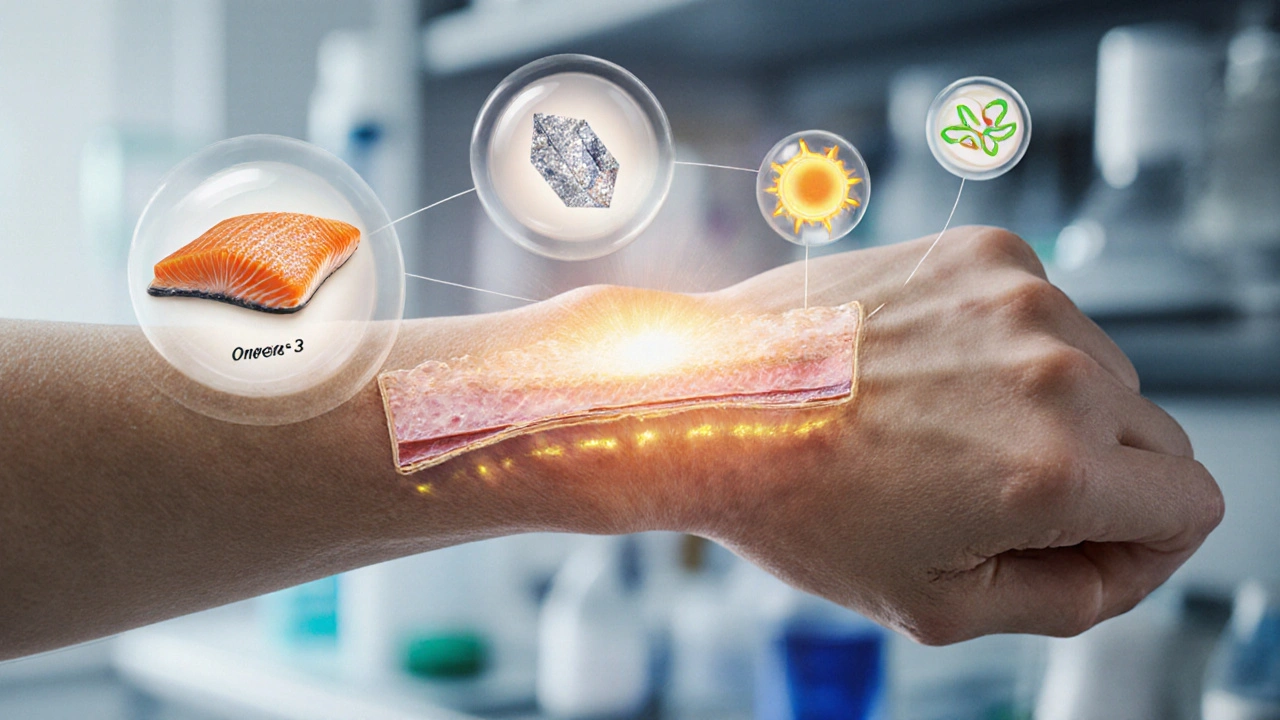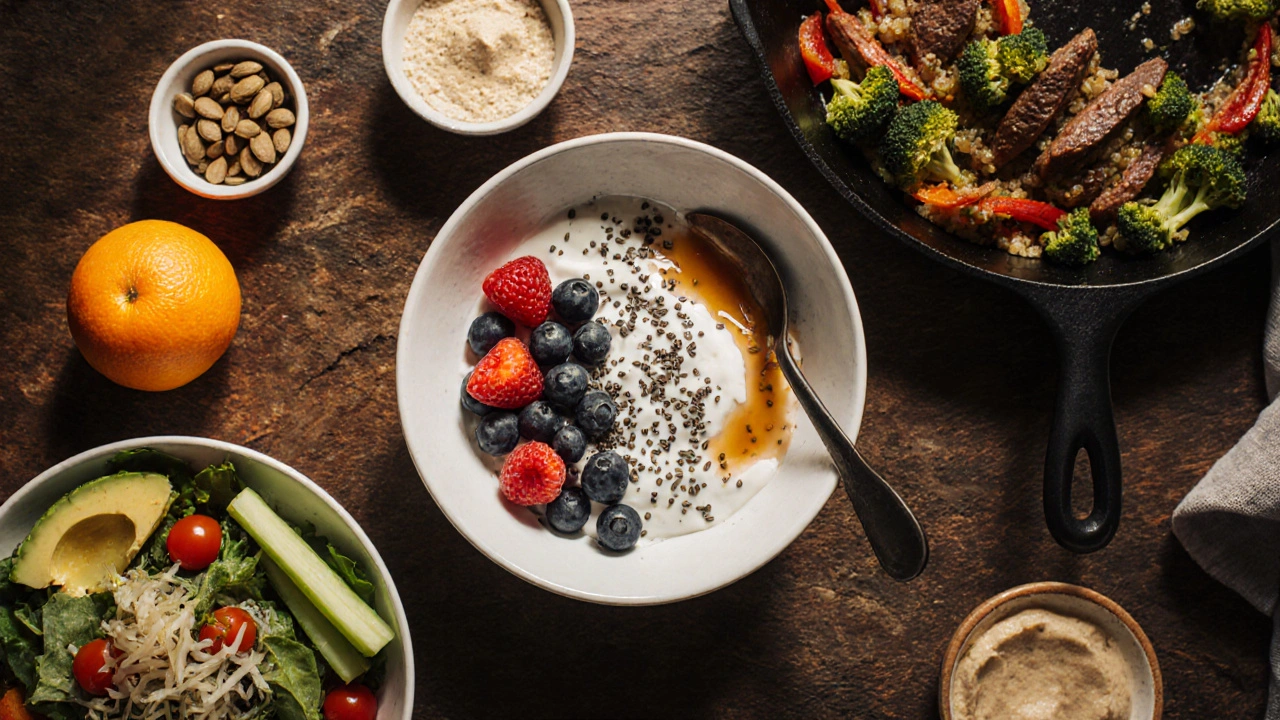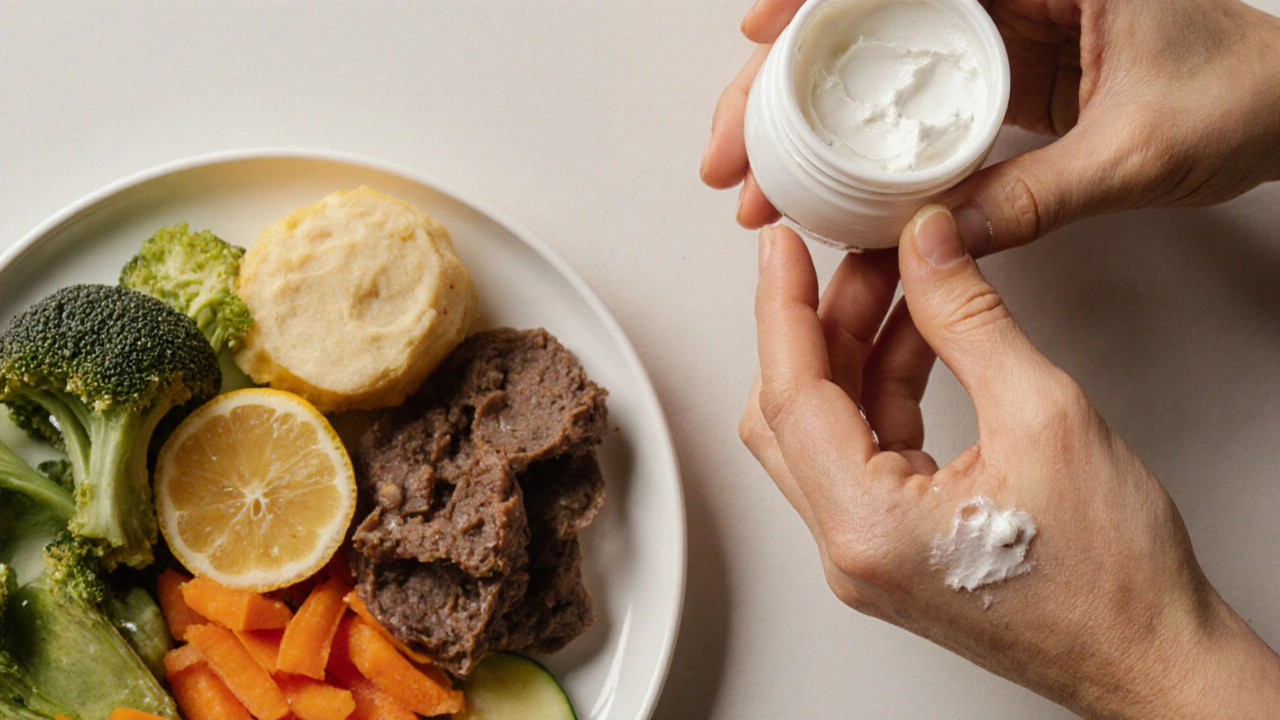How Diet and Nutrition Can Prevent and Treat Scabies (Sarcoptes scabiei)
 Oct, 13 2025
Oct, 13 2025
When it comes to battling Sarcoptes scabiei - the mite that causes scabies - most people think of prescription creams and intense hygiene. While those are essential, diet the foods you eat and the nutrients they provide plays a surprisingly powerful role in both preventing infestations and easing symptoms once they appear. By feeding your immune system and reinforcing the skin’s natural barrier, the right nutrition can make the mite’s job a lot harder.
Quick Takeaways
- Strong immune function and a healthy skin barrier are the first line of defense against scabies.
- Omega‑3 fatty acids, zinc, vitamin D, and probiotics are the top nutrients that help.
- Anti‑inflammatory foods and balanced protein intake can reduce itching and speed healing.
- Nutrition works best alongside standard scabies treatments, not as a replacement.
- Avoid high‑sugar, processed foods that weaken immunity and worsen skin irritation.
Understanding Scabies and the Skin Barrier
The mite burrows into the outer layer of the skin, laying eggs that trigger an allergic reaction. This reaction shows up as intense itching, tiny blisters, and a rash that often spreads in a characteristic pattern. The skin’s barrier - made up of lipids, proteins, and natural acids - is what keeps irritants out and moisture in. When that barrier is compromised, the immune system reacts more aggressively, and the mite can thrive.
Research from the Australian Institute of Health (2023) shows that people with chronic skin conditions like eczema, which already have a weaker barrier, are up to three times more likely to develop severe scabies outbreaks.

How Nutrition Affects the Immune Response to Mites
Nutrition directly feeds the cells that patrol your skin and bloodstream. immune system the network of white blood cells, antibodies, and signaling molecules that defend against infection relies on micronutrients to produce cytokines, perform phagocytosis, and maintain a balanced inflammatory response.
When you consume foods rich in anti‑oxidants and essential minerals, you give your immune cells the raw material they need to recognize and destroy foreign invaders - including scabies mites. Conversely, diets high in refined sugars and saturated fats can blunt immune signaling, making it easier for the mite to establish a foothold.
Top Nutrients That Strengthen Skin and Fight Scabies
Below is a quick glance at the nutrients most backed by scientific evidence for scabies support.
| Nutrient | Primary Role | Top Food Sources |
|---|---|---|
| Omega‑3 fatty acids essential polyunsaturated fats that reduce inflammation | Calms skin inflammation, improves barrier lipid composition | Fatty fish (salmon, mackerel), chia seeds, walnuts |
| Zinc trace mineral crucial for immune cell development | Boosts white‑blood‑cell activity, aids wound healing | Oysters, beef, pumpkin seeds, lentils |
| Vitamin D fat‑soluble vitamin that modulates immune response | Enhances antimicrobial peptide production, reduces itching | Sun exposure, fortified milk, egg yolks, mushrooms |
| Probiotics live beneficial bacteria that support gut‑skin axis | Improves skin barrier, balances inflammation | Yogurt, kefir, sauerkraut, kombucha |
| Vitamin C water‑soluble antioxidant | Promotes collagen synthesis, protects skin cells | Citrus fruits, bell peppers, strawberries, kiwi |
Incorporating these foods doesn’t replace topical permethrin or ivermectin, but it creates an internal environment where the mite struggles to survive.

Sample Meal Plan for Scabies Support
Here’s a practical, day‑long menu that hits all the key nutrients. Feel free to swap similar items based on preference or availability.
- Breakfast: Greek yogurt topped with chia seeds, fresh berries, and a drizzle of honey. (Probiotics, omega‑3, vitamin C)
- Mid‑morning snack: Handful of pumpkin seeds and an orange. (Zinc, vitamin C)
- Lunch: Grilled salmon salad with mixed greens, avocado, cherry tomatoes, and a lemon‑olive‑oil dressing. (Omega‑3, vitamin D, healthy fats)
- Afternoon snack: Sliced cucumber with hummus. (Protein, zinc from chickpeas)
- Dinner: Stir‑fried beef strips with broccoli, bell peppers, and quinoa. Finish with a side of sauerkraut. (Zinc, vitamin C, probiotics, complex carbs)
- Evening drink: Warm milk fortified with vitamin D or a cup of mushroom tea.
Sticking to this pattern for a week can noticeably reduce itching and speed skin recovery.
Common Pitfalls and Myths
- Myth: “If I eat enough vitaminC, I won’t need medication.”
Reality: VitaminC helps healing but cannot kill the mite. Medicated creams are still required. - Myth: “Low‑fat diets are always better for skin health.”
Reality: Healthy fats, especially omega‑3s, are essential for skin barrier lipids. - Pitfall: Over‑reliance on sugar‑free diets without increasing nutrient density.
Solution: Replace sugary snacks with nutrient‑dense alternatives like nuts, fruit, and fermented foods.

When to Seek Medical Treatment - Integrating Diet with Standard Care
Even the best diet won’t eradicate a heavy infestation on its own. If you notice widespread rash, intense nightly itching, or a rash that spreads beyond 48hours after starting nutrition changes, consult a healthcare professional.
Standard treatment usually involves a single application of permethrin 5% cream or a short course of oral ivermectin. Pair those with the nutrition plan outlined above and you’ll likely experience a smoother recovery, fewer secondary infections, and less chance of re‑infestation.
Remember to wash all bedding, clothing, and towels at 60°C (140°F) and vacuum carpets thoroughly - the environment is as important as the body.
Frequently Asked Questions
Can a specific diet cure scabies without medication?
No. Nutrition can strengthen the skin and immune response, making symptoms milder and recovery faster, but it does not kill the mite. Prescription creams or oral meds are still needed for clearance.
How long does it take to see improvement from dietary changes?
Most people notice reduced itching and faster rash fading within 7‑10days if they follow the nutrient‑rich plan consistently alongside medical treatment.
Are supplements necessary if I can’t eat certain foods?
A high‑quality omega‑3 fish oil capsule, zinc gluconate (15mg daily), and a vitaminD3 tablet (1000-2000IU) can fill gaps, but consult a doctor before starting any supplement regimen.
Does weight loss help prevent scabies?
Excess body fat can impair immune function and increase skin friction, which may worsen itching. Maintaining a healthy weight through balanced nutrition supports overall immunity, indirectly lowering scabies risk.
What foods should I avoid during a scabies outbreak?
Limit refined sugars, processed snacks, and excessive alcohol. These items raise inflammatory markers and can aggravate itching.
While no diet can replace proven scabies medication, the right diet and nutrition scabies strategy gives your body the tools it needs to fight the mite, soothe the skin, and prevent future flare‑ups. Pairing food‑based support with proper hygiene and prescription treatment offers the best chance for a quick, lasting recovery.

Sebastian Miles
October 13, 2025 AT 20:35The article nails the concept of lipid barrier reinforcement via omega‑3 incorporation.
Targeting phospholipid homeostasis directly boosts cutaneous resilience.
Coupling that with zinc‑mediated leukocyte activation creates a synergistic immune front.
Stick to the suggested regimen and you’ll likely see pruritus attenuation within a week.
Harshal Sanghavi
October 13, 2025 AT 21:05Oh great, another diet plan to add to the growing list of “miracle cures”-just what we needed while the mites are doing the macarena on our skin.
In all seriousness, loading up on fish oil and probiotic yogurt does give your immune cells a better chance to spot those unwelcome tenants.
Just don’t expect the veggies to slap the mites off; keep the prescribed cream in the rotation.
If you pair both, the itching will probably calm down faster than a Netflix binge.
Duke Gavrilovic
October 13, 2025 AT 21:35While the scientific basis for nutrient‑driven skin fortification is well‑documented, it is essential to contextualize these recommendations within diverse dietary practices worldwide.
For instance, populations with limited access to marine sources may rely on alternative omega‑3‑rich foods such as flaxseed or algae supplements.
Equally, cultural preferences for fermented foods can provide the probiotic benefits highlighted in the article.
Balancing these considerations with the pharmacologic regimen ensures both efficacy and cultural relevance.
Overall, an integrative approach respects both biomedical evidence and individual dietary landscapes.
Abby VanSickle
October 13, 2025 AT 22:05I understand the frustration that comes with relentless itching, and I appreciate how the nutritional guidance offers a constructive adjunct to conventional therapy.
Maintaining a balanced intake of zinc and vitamin D can indeed modulate the inflammatory cascade without compromising the skin’s barrier integrity.
Nevertheless, it remains imperative to follow the prescribed antiparasitic treatment to eradicate the mite promptly.
chris macdaddy
October 13, 2025 AT 22:35Yo, this plan is solid – eat that salmon and yogurt and you’ll feel less itchy fast.
Don’t forget the pumpkin seeds for zinc, they’re cheap and work big time.
Just keep using the cream too, n’ you’ll be good.
Moumita Bhaumik
October 13, 2025 AT 23:05Don’t be fooled by the “official” diet spiel; the same pharma giants push the cream while silencing natural remedies.
They don’t want you to know that a simple gut‑boost can starve the mites.
Stay skeptical and keep your pantry stocked with real foods.
Sheila Hood
October 13, 2025 AT 23:35Sure, a bowl of kefir will magically evict the mites, right? Sadly, the cream still does the heavy lifting.
Melissa Jansson
October 14, 2025 AT 00:05While the mainstream narrative glorifies omega‑3s as the panacea for scabies, the lipid peroxidation pathways suggest a more nuanced picture.
Excess polyunsaturated fats, if not balanced, could theoretically compromise the ceramide matrix.
Hoyt Dawes
October 14, 2025 AT 00:35This article reads like a cookbook for the chronically bored.
Fiona Doherty
October 14, 2025 AT 01:05Honestly, buying into another “miracle” diet while you’re already slathered in prescription cream is just lazy self‑medication.
Neil Greer
October 14, 2025 AT 01:35Hey, good point on the pumpkin seeds – they’re a great zinc source, but maybe add a bit more variety so you don’t get bored with the same routine.
Fionnuala O'Connor
October 14, 2025 AT 02:05Great overview – keep it simple and stick to the basics.